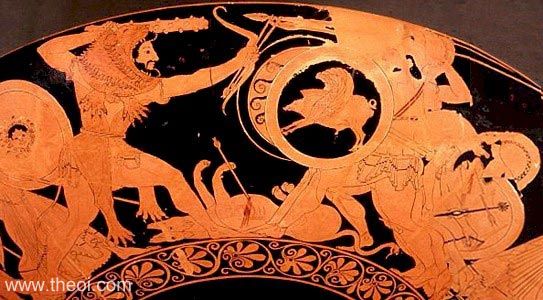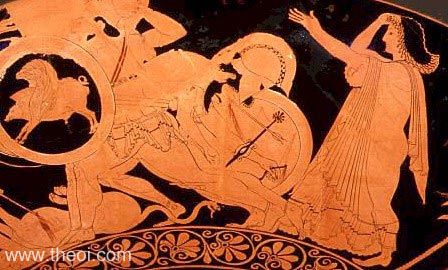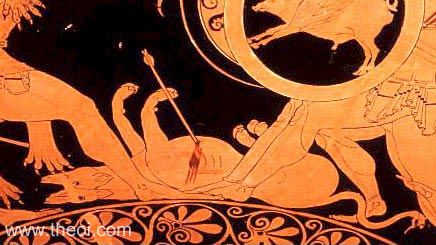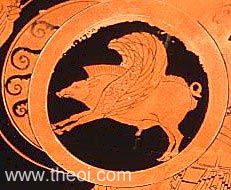Heracles, Geryon, Callirhoe & Orthrus (original) (raw)
Greek Mythology >> Galleries >> Greek Vase Paintings 4 >> L3.1

DETAILS
| Museum Collection | Staatliche Antikensammlungen, Munich |
|---|---|
| Catalogue No. | Munich 2620 |
| Beazley Archive No. | 200080 |
| Ware | Attic Red Figure |
| Shape | Kylix, Type B |
| Painter | Signed by Euphronios |
| Date | ca. 510 - 500 B.C. |
| Period | Late Archaic |
DESCRIPTION
Side A: Heracles battles the three-bodied giant Geryon. The hero is dressed in a lion-skin cape and wields a club in one hand and a bow in the other. Behind him stands the goddess Athena holding a shield emblazoned with the Gorgoneion (Gorgon's head).The two-headed dog Orthrus lies dead at the feat of Geryon its breast pierced by an arrow. Geryon aims his spears at the hero. One of his three bodies is already dead, pierced through the eye by an arrow. He holds three shields, one is inscribed with the symbol of an octopus while the other depicts a winged boar--perhaps loosely representing his father, Chrysaor, twin-brother of the winged horse Pegasus. Geryon's mother, Callirhoe (see other image), stands behind him gesturing suggesting her worry and distress.
Side B: The cattle of Geryon (not shown).
IMAGE DETAIL 1

Detail of Geryon and Callirhoe.
Callirhoe, the Oceanid nymph mother of Geryon, raises her hands in distress as the first of the three bodies of Geryon is felled by the arrows of Heracles.
"[Callirhoe laments :] I, unhappy woman, miserable in the child I bore, miserable in my sufferings; I beseech you, Geryon [not to fight Heracles]." - Stesichorus, Geryoneis Frag 513
IMAGE DETAIL 2

Detail of the hound Orthrus.
Detail of the two-headed hount Orthrus lies dead on its back with an arrow protruding from its breast. It has two heads and a serpent for a tail.
"Before him [Heracles] slain lay that most murderous hound Orthrus, in furious might like Cerberus his brother-hound." - Quintus Smyrnaeus, Fall of Troy 6.249
IMAGE DETAIL 3

Detail of the winged boar.
A winged boar decorates the shield of Geryon. It may represent his father Chrysaor--literally or figuratively-- who was a son of the tusked Gorgon Medusa and twin of the winged horse Pegasus.